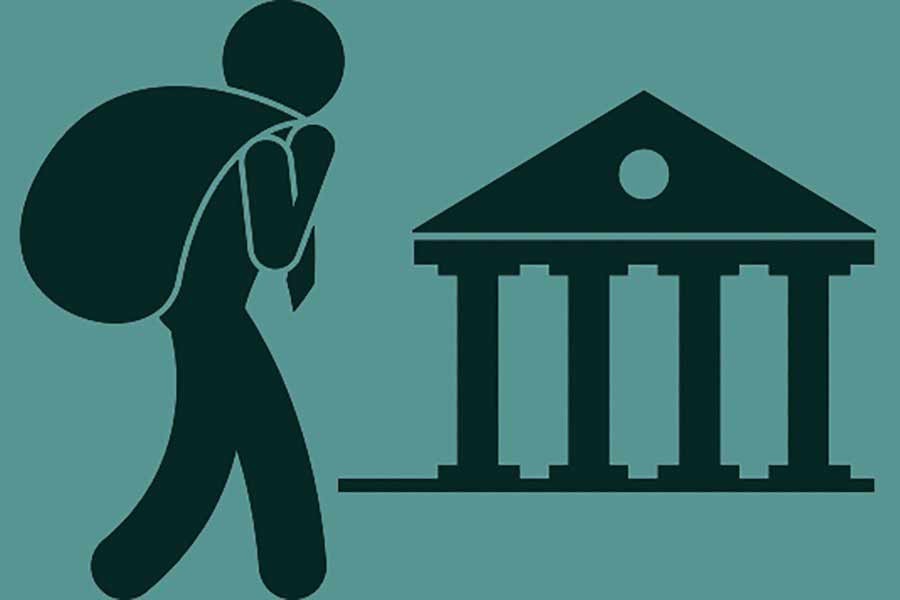Higher levels of corruption are often associated with large underground or black economies. A 2018 study by IMF estimated the size of the underground economy in Bangladesh to be around 30 per cent of gross domestic product (GDP), the average for the period 1991-2015 being 33.59 per cent. It, however, incorporated mostly legal economic activities and tried to overlook illegal or criminal activities such as gambling and prostitution, as well as 'do-it-yourself' and household work.
Maximum black money is generated through transaction of spurious goods, drugs trade and human trafficking, according to the Washington-based think-tank Global Financial Integrity (GFI). No reliable research has shown black money returning to the mainstream economy in a big way when opportunity for whitening is provided.
In fact, the main destinations of black money are foreign territories. For example, a large chunk is deposited in Swiss banks, as the 'Swiss Banking Act' of 1934 ensures non-divulgence of information about individual depositors. And some are transferred to tax havens like the USA, Canada, the UK, the UAE, Thailand or Singapore through purchase of properties or setting up of companies.
Therefore, most of the black money generated in Bangladesh is laundered abroad, with only a negligible portion remaining in the country.
Although the fortunes of Swiss banks have dwindled over recent years, deposits from Bangladesh have gradually grown since 2004. While the amount was only Tk 3.65 billion in 2004, it reportedly increased to Tk 53.67 billion during 2019. Bangladesh is ranked 85th overall and only second after India among the South Asian countries in terms of Swiss deposits. The overall rankings for Pakistan, Nepal and Sri Lanka are 99, 118 and 148 respectively. India was ranked 37th in 2005, but has now lifted its ranking to 77th position. Despite being a huge economy, the deposits by Indians were only about 50 per cent higher than Bangladeshi citizens.
No clear information can be obtained on whether the money kept in Swiss banks is black or white. But many countries now seek to know the amount of black money deposited by their citizens. Some countries like India have even signed agreement with the Swiss government for getting information about their citizens' deposits. India is already receiving such information from 2019, and as a consequence deposits by Indians have drastically fallen. Bangladesh could have done the same for tracking the black money flowing out of the country.
The Bangladesh prime minister informed parliament in June 2014 that her government would send a letter to the Swiss government seeking the list of Bangladeshi depositors there. After that, Bangladesh Financial Intelligence Unit (BFIU) of the central bank and the National Board of Revenue (NBR) made some moves for gathering information from the Financial Intelligence Unit (FIU) of Switzerland. Letters of enquiry were sent about the money kept there by Bangladeshi citizens as well as the possibility of signing an agreement with the Swiss central bank for facilitating the exchange of information. But the matter stopped there.
BFIU became a member of the Egmont Group in July 2013, which is an international forum comprising the FIUs of various countries that work on information related to money laundering and financing of terrorism.
After obtaining this membership, the then governor of Bangladesh Bank claimed that none from Bangladesh would be spared had they laundered money through corruption. However, the deeds of the central bank have not matched with the words of its governor in subsequent years. No strong measures have been taken by the entity in that direction till now.
In absence of official statistics, the Washington-based Global Financial Integrity (GFI) has been publishing reliable data on the money laundered from various countries through international trade each year. The published information included Bangladesh (since 2004). Whereas statistics about other countries are available up to 2017, information on Bangladesh has remained stuck up to 2015. This is because Bangladesh has mysteriously refrained from providing data on international trade to the UN since 2016.
According to GFI statistics, an average amount of US$7.53 billion is laundered each year from Bangladesh through international trade, which is equivalent to Tk 640 billion. Therefore, Bangladesh is ranked 33th among the 135 developing countries with regard to the amount of money laundered from the country. After the release of GFI reports each year, the responses from the official quarters are routinely similar - warning of taking action or more stringent measures by the ACC. Nothing happens so far.
The Michigan State University of USA had conducted a research titled 'Election and Capital Flight: Evidence from Africa' by analysing data from 1971 to 2009. It found a linkage between the election cycles and capital flights. A similar trend has been observed in Bangladesh as well. For example, deposits in Swiss banks from Bangladesh rose during 2006 and 2007 amid electoral uncertainties; but it came down in 2008 due to strict measures taken by the military-backed caretaker government. The deposits again dramatically rose prior to the 2014 election.
Now the big question is: Do the authorities really want to curb money laundering? And is the failure to hold talks with the Swiss central bank due merely to lack of required skills? Or is there dearth of official willingness? Unfortunately, despite the rhetoric of 'zero tolerance' against corruption, there are no sustained initiatives in that direction. While hardworking people of Bangladesh, the emerging middle-class, professionals, expatriate workers and peasants have been carrying forward the country's advancement through tireless efforts; a coterie of powerful and upper-class people do not pay taxes, plunder the stock market, launder money and embezzle over-valued projects. The common people work hard by keeping faith in the country's potentials, but others lack such faith and launder money abroad. There is protection for such crimes and the situation is unlikely to improve unless the political statements and operational policies converge.
Dr. Helal Uddin Ahmed is a retired Additional Secretary and former Editor of Bangladesh Quarterly.


